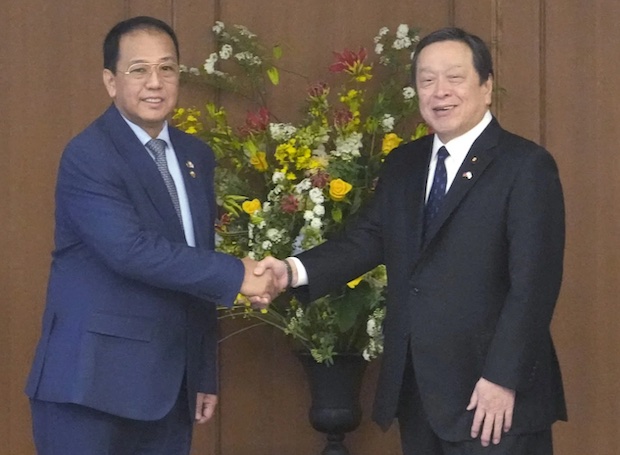Gov’t to review defense deal with Japan, US

EXPLORING AREAS OF COOPERATION | Defense Secretary Carlito Galvez Jr. and his Japanese counterpart Yasukazu Hamada shake hands before the start of their bilateral meeting in Tokyo on Friday. (Agence France-Presse)
TOKYO — The Marcos administration will review a proposed trilateral defense and security deal with the Philippines’ longtime allies, Japan and the United States, as part of a “continuing and ongoing process” in pursuing alliances with other nations.
President Ferdinand Marcos Jr. said the tripartite agreement is something that will definitely be assessed upon his return to Manila on Sunday night.
“I think [this is] just part of the continuing process of strengthening our alliances in this rather confusing, and I dare say dangerous situations, that we have,” Marcos said in an interview with Japan’s Kyodo News.
“I’m not talking only about the South China Sea. I’m not only talking about the Indo-Pacific region. But, of course, there is a conflict still ongoing in Ukraine and the rather disturbing effects that it has all around the world,” he added.
The proposed trilateral defense and security agreement between the Philippines and its two allies was among the issues discussed during Marcos’ bilateral meeting with Japanese Prime Minister Fumio Kishida last Thursday.
Article continues after this advertisement“That is, I think, a central element to… providing some sort of stability in the face of all these problems that we are seeing around us,” the chief executive said.
Article continues after this advertisementThis will be through strategic reciprocal port calls and aircraft visits, transfer of more defense equipment and technology, continuous cooperation on previously transferred defense equipment, and capacity building.
Regional security
Sen. Francis Tolentino said China should not take it against the Philippines if the government decides to enter into a trilateral security agreement with Japan and the United States and conduct joint activities in Philippine waters.
“If (China) really respects the sovereignty of the Philippines, nothing should prevent a free country to take steps in strengthening our own defense posture and exercise our right to defend ourselves,” Tolentino, vice chair of the Senate foreign relations committee, said in a radio interview on Sunday.
He said China should actually welcome this move to promote peace and security in the South China Sea “if they really have no bad intentions.”
Like the Philippines, Japan is also in a maritime dispute with China over the Senkaku Islands in the Okinawa prefecture.
Tolentino said he believed that having a military deal with Japan, similar to the Visiting Forces Agreement (VFA) between the United States and the Philippines, would be beneficial for the country.
He noted that the Philippines had previously signed a similar defense cooperation deal with Australia, the Status of Visiting Forces Agreement which the Senate ratified in 2012.
The senator said such an agreement with Japan would also help the government save hundreds of millions of pesos in defense spending.“We could allocate these to spend for the needs of our senior citizens, improve the quality of public education or in modernizing our agriculture,” Tolentino said.
Defusing tension
A political analyst noted that enhancing security cooperation between the Philippines and Japan will help ease tensions in the West Philippine Sea and send a message that keeping the Indo-Pacific region open and free is in the interest of all countries.
“Both the leaders from the Philippines and Japan agree very well on how we could attain what we call a free and open Indo-Pacific, which is very good. Because that will really defuse some tensions or potential conflicts away from the very contentious issue of the West Philippine Sea,” Froilan Calilung, a political science professor at the University of Santo Tomas, said at the Saturday News Forum in Quezon City.
For Calilung, however, security issues in the greater Indo-Pacific area, such as the West Philippine Sea dispute, should not be treated as a concern only between the United States and China.
“This may send a very good message to countries like the US and even China that the security dimension is not actually being monopolized by the regional or the world superpowers themselves. These cooperative patterns are good,” he said.
House Deputy Minority Leader France Castro called on the Marcos administration to only consider security agreements with other countries that have no strings attached.